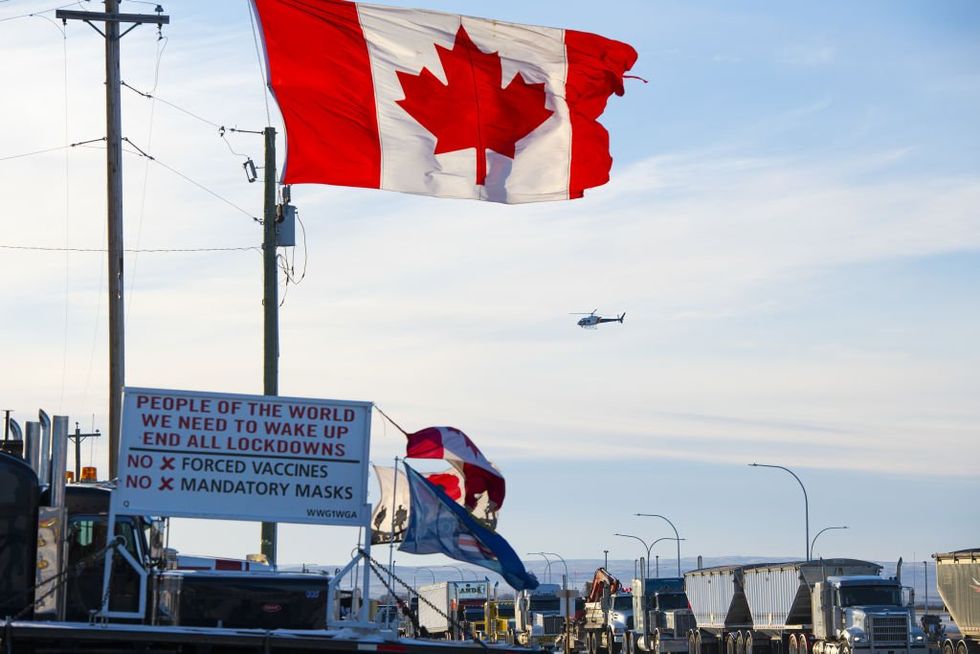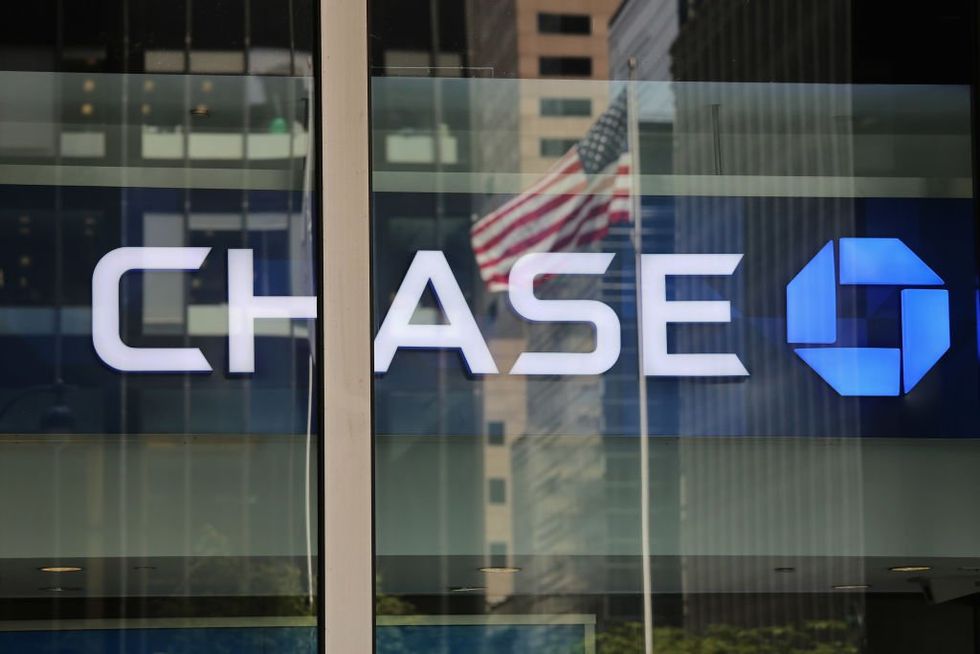How Trump can help get justice for Canada's Freedom Convoy prisoners
Of all those cheering Donald Trump’s recent re-election as a victory over leftist tyranny, one group has especially personal reasons to celebrate: the roughly 1,400 Americans charged with crimes related to the Capitol protests of January 6, 2021. While these defendants and their families wait for the pardons Trump has hinted at, another set of prisoners languishes behind bars to the north. Though Canadian and not subject to the president-elect’s direct authority, their fate may also depend on actions Trump takes during his second term. Pressure from Biden emboldened Trudeau to invoke Canada’s Emergencies Act, which grants the federal government additional powers during threats to national security. Like the January 6 protests that preceded it, the movement that came to be known as the Freedom Convoy was a massive, decentralized, and spontaneously organized uprising against the authoritarian injustices of a liberal regime, this one of the Liberal Party of Canada. A nationwide rebellion It began in January 2022, when Canadian truckers organized a few separate convoys protesting COVID vaccine mandates for crossing the United States border. As these convoys converged in the capital, Ottawa, the movement grew into a nationwide rebellion against Prime Minister Justin Trudeau’s draconian regime of pandemic restrictions. The Freedom Convoy lit a fire around the world, garnering praise from former president Trump and inspiring many similar protests, including the People’s Convoy here in the United States. Over three weeks, thousands of Canadians demonstrated in Ottawa and around the country, disrupting traffic and blockading various border crossings. The protests were so effective, in fact, that they drew the ire of the Biden administration, then — as today — aggressively prosecuting anyone involved with the January 6 “insurrection.” The Democrat Party line was to cast these protesters as conspirators in the worst attack on America since 9/11, or even Pearl Harbor. As such, participants who were guilty of trespassing, at most, found themselves burdened with additional, spurious charges such as "entering and remaining in a restricted building" or "disorderly conduct.” Sentencing, too, was and continues to be unduly harsh — especially in cases involving no violence or property damage, let alone any demonstrable intent to overthrow the government. One such glaring example is that of Christian Secor, currently serving 42 months in federal prison essentially for sitting in Vice President Pence’s Senate seat. Biden butts in It was this authoritarian zeal that President Biden brought to the situation in Canada, America’s largest trading partner and longtime ally, with which it shares the longest undefended border in the world. Pressure from Biden emboldened Trudeau to invoke Canada’s Emergencies Act, which grants the federal government additional powers during threats to national security, a move Trudeau was considering from the get-go. The crackdown was swift and merciless. A situation at one of these protests, used by Trudeau to justify his controversial use of the Emergencies Act, involved four men arrested the night before it was invoked. The arrests took place at the protest in Coutts, a tiny village where Alberta Highway 4 crosses into Montana to become Interstate 15. As one of the busiest border crossings on the entire prairie, Coutts was of particular concern to both Biden and Trudeau Royal railroading On February 13, 2022, the Royal Canadian Mounted Police raided the protest site at Coutts and arrested 13 people, charging many with mischief and other nuisance charges that were likewise leveled at those in Ottawa later that week. Based on unrecorded and unverifiable testimony from undercover officers, and having confiscated hunting rifles using a faulty warrant, four of those arrested were charged with "conspiracy to murder police officers," a heinous accusation that shocked the nation. Despite having no criminal records or histories of violence, these four men, who would come to be known as the Coutts Four, were held without bail for two years while waiting to come to trial. Two of the men, Jerry Morin, a 43-year-old electrical lineman, and Tony Olienick, a 42-year-old trucking, excavation, and quarrying company owner, were kept for long periods of time in solitary confinement, a recognized form of torture and surely beyond the pale for a country like Canada, which has a proud tradition of leading U.N. peacekeeping missions and advocating for civil rights and democracy around the world. Conspiracy of silence During the two years of these men’s incarceration, the Canadian media said nothing about their treatment or the dubious and murky nature of their charges. The allegations about the Coutts Four, before ever being tested in court, were cited in a mandatory inquest into Trudeau’s invocation of the Emergencies Act, and they continue to be seen as a legitimating factor, even thou


Of all those cheering Donald Trump’s recent re-election as a victory over leftist tyranny, one group has especially personal reasons to celebrate: the roughly 1,400 Americans charged with crimes related to the Capitol protests of January 6, 2021.
While these defendants and their families wait for the pardons Trump has hinted at, another set of prisoners languishes behind bars to the north. Though Canadian and not subject to the president-elect’s direct authority, their fate may also depend on actions Trump takes during his second term.
Pressure from Biden emboldened Trudeau to invoke Canada’s Emergencies Act, which grants the federal government additional powers during threats to national security.
Like the January 6 protests that preceded it, the movement that came to be known as the Freedom Convoy was a massive, decentralized, and spontaneously organized uprising against the authoritarian injustices of a liberal regime, this one of the Liberal Party of Canada.
A nationwide rebellion
It began in January 2022, when Canadian truckers organized a few separate convoys protesting COVID vaccine mandates for crossing the United States border. As these convoys converged in the capital, Ottawa, the movement grew into a nationwide rebellion against Prime Minister Justin Trudeau’s draconian regime of pandemic restrictions.
The Freedom Convoy lit a fire around the world, garnering praise from former president Trump and inspiring many similar protests, including the People’s Convoy here in the United States. Over three weeks, thousands of Canadians demonstrated in Ottawa and around the country, disrupting traffic and blockading various border crossings.
The protests were so effective, in fact, that they drew the ire of the Biden administration, then — as today — aggressively prosecuting anyone involved with the January 6 “insurrection.”
The Democrat Party line was to cast these protesters as conspirators in the worst attack on America since 9/11, or even Pearl Harbor. As such, participants who were guilty of trespassing, at most, found themselves burdened with additional, spurious charges such as "entering and remaining in a restricted building" or "disorderly conduct.”
Sentencing, too, was and continues to be unduly harsh — especially in cases involving no violence or property damage, let alone any demonstrable intent to overthrow the government. One such glaring example is that of Christian Secor, currently serving 42 months in federal prison essentially for sitting in Vice President Pence’s Senate seat.
Biden butts in
It was this authoritarian zeal that President Biden brought to the situation in Canada, America’s largest trading partner and longtime ally, with which it shares the longest undefended border in the world. Pressure from Biden emboldened Trudeau to invoke Canada’s Emergencies Act, which grants the federal government additional powers during threats to national security, a move Trudeau was considering from the get-go.
The crackdown was swift and merciless. A situation at one of these protests, used by Trudeau to justify his controversial use of the Emergencies Act, involved four men arrested the night before it was invoked.
The arrests took place at the protest in Coutts, a tiny village where Alberta Highway 4 crosses into Montana to become Interstate 15. As one of the busiest border crossings on the entire prairie, Coutts was of particular concern to both Biden and Trudeau
Royal railroading
On February 13, 2022, the Royal Canadian Mounted Police raided the protest site at Coutts and arrested 13 people, charging many with mischief and other nuisance charges that were likewise leveled at those in Ottawa later that week.
Based on unrecorded and unverifiable testimony from undercover officers, and having confiscated hunting rifles using a faulty warrant, four of those arrested were charged with "conspiracy to murder police officers," a heinous accusation that shocked the nation.
Despite having no criminal records or histories of violence, these four men, who would come to be known as the Coutts Four, were held without bail for two years while waiting to come to trial.
Two of the men, Jerry Morin, a 43-year-old electrical lineman, and Tony Olienick, a 42-year-old trucking, excavation, and quarrying company owner, were kept for long periods of time in solitary confinement, a recognized form of torture and surely beyond the pale for a country like Canada, which has a proud tradition of leading U.N. peacekeeping missions and advocating for civil rights and democracy around the world.
Conspiracy of silence
During the two years of these men’s incarceration, the Canadian media said nothing about their treatment or the dubious and murky nature of their charges.
The allegations about the Coutts Four, before ever being tested in court, were cited in a mandatory inquest into Trudeau’s invocation of the Emergencies Act, and they continue to be seen as a legitimating factor, even though another Superior Court ruling found Trudeau’s invocation to be "unreasonable" and "unjustified."
To this day, few Canadians — never mind Americans — are aware of what happened to the Coutts Four.
Morin and Chris Lysak, 50, an electrician, were eventually released in February 2024 after pleading guilty to lesser charges.
It is widely understood that the confession from Morin to "conspiracy to traffic firearms" was coerced by keeping him solitary; his appeal is pending. During the trial, the "firearms" undercover officers claimed Morin handled were proven to be socks, underwear, and a guitar.
Lysak plead guilty to a gun mishandling charge, an easily applied offense in a country with no constitutionally protected gun rights and where owning a pistol is nearly impossible.
It is also a very strange coincidence that Lysak and Morin were released about a week after Tucker Carlson appeared on stage in Alberta and mentioned their case. Thus far, Carlson is the only major media personality to have highlighted the plight of the Coutts Four at all.
A case of collusion?
The other two men, Olienick and Chris Carbert, eventually went to trial over two years after being arrested. While acquitted of the charge of conspiracy to murder police officers, they were found guilty of the lesser charges of mischief and possession of weapons for a dangerous purpose.
In sentencing of the two men, the judge effectively did an "end run" around that not-guilty verdict, comparing their peaceful protest to another case in which a man drove his vehicle into Canada’s Parliament and wandered around with guns, actively looking for politicians to shoot.
As if that weren't indication enough of the political nature of the case, evidence allegedly showing that Crown Prosector Steven Johnston broke the law in building a case against the Coutts Four has been sealed. Given what we know about allegations of collusion between Johnston and the RCMP, it seems likely that the case against the Coutts Four would have been thrown out.
Olienick and Carbert remain in custody, serving out six and a half years for politically trumped-up charges.
Like the Biden administration, which (as if to avenge the Democrats’ humiliating defeat at the polls) has vowed to spend its final two months making even more January 6 arrests, Trudeau is unrepentant about turning on his own people.
Trump vs. Trudeau
What, then, can Trump do once he takes office in January?
While the two leaders have had a congenial enough relationship in the past, Trudeau and his ministers have spent a lot of time bad-mouthing Trump in Canada’s Parliament; President Trump’s new Cabinet nominees have taken note and are starting off their relationship with Trudeau on a sour note.
There’s also the matter of Trudeau’s plummeting popularity within Canada. With members of his own party recently urging him to step down, the prime minister is more vulnerable than at any other time in his career.
This presents ideal conditions for Trump to press the issue of the Coutts Four, perhaps in trade policy negotiations or while pointing out Canada’s failure to live up to its NATO commitments or adequately fund its own military.
Then, of course, there’s Canada’s tendency to let an alarming number of illegal immigrants, including hundreds of terrorists, slip across the border and into America.
MAGA diplomacy
President Trump would do his many freedom-loving fans in Canada a great service by publicly acknowledging the Coutts Four as political prisoners, persecuted, like so many of the Freedom Convoy protestors, by an overzealous, politically-motivated government, which is still convicting peaceful protesters to this day.
Such an acknowledgment would emphasize Trump’s commitment to undo the damage wrought by the Biden regime, while strongly encouraging Canada to safeguard the liberty of its own citizens.
With both countries having atoned for the shameful treatment of their own citizens, America and Canada could then build an even stronger relationship, one based on mutual prosperity and security.
Originally Published at Daily Wire, World Net Daily, or The Blaze
What's Your Reaction?

































































































